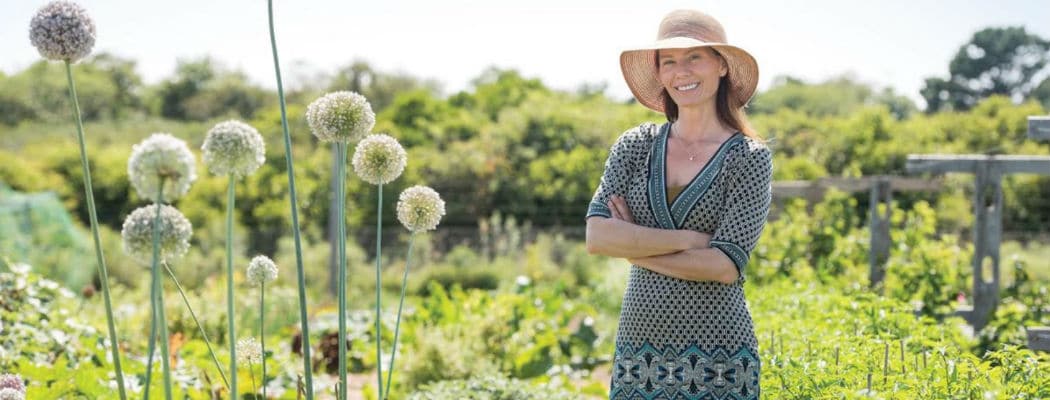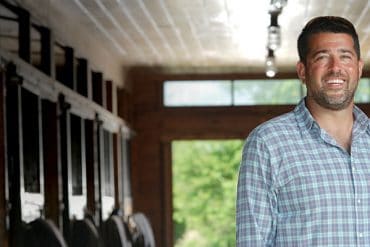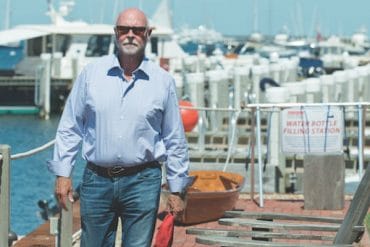Sustainable Nantucket has blossomed to one of the Island’s most vital organizations.
Since taking her post as the executive director of Sustainable Nantucket nearly a decade ago, Michelle Whelan has quietly cultivated the organization into one of the most vibrant and expansive nonprofits on the island. Sustainable Nantucket holds the weekly farmers’ and artisans’ market, publishes its own magazine, has a trademarked brand, maintains its own community farm, and offers a wide variety of educational programs. On October 12th, Whelan and her team will add to its mission with the second-annual Nantucket Grown Food Festival.
 The festival is a natural extension of Sustainable Nantucket’s year-round work to preserve the agricultural character of Nantucket by sustaining its economic and environmental vitality. Last year, six hundred people enjoyed twenty-three events spread out over three days. In fact, demand was so high for these events that an extra day has been added to this year’s festival in an effort to celebrate, educate, and support local and regional food. The festival aligns with the harvests of oysters, vegetables, and the almighty Nantucket bay scallops.
The festival is a natural extension of Sustainable Nantucket’s year-round work to preserve the agricultural character of Nantucket by sustaining its economic and environmental vitality. Last year, six hundred people enjoyed twenty-three events spread out over three days. In fact, demand was so high for these events that an extra day has been added to this year’s festival in an effort to celebrate, educate, and support local and regional food. The festival aligns with the harvests of oysters, vegetables, and the almighty Nantucket bay scallops.
The theme of this year’s festival is reimagining the sustainable plate. Sustainable Nantucket wants to introduce people to uncommon culinary offerings that could have a positive impact on the environment. The opening night will feature seven chefs from top island restaurants and six local growers executing their take on local foods not often seen on menus, including kelp, invasive green crab, and other wild plants. Festival attendees with less daring palates will still be able to enjoy mainstay delicacies like oysters, chocolate, cheese, bread, and local libations by Cisco Brewers. Sustainable Nantucket hopes people will give these new flavors a shot. Introducing festivalgoers to uncommon foods like kelp and green crab is part of the organization’s overarching mission of sustainability.
Creating a market for green crab, for instance, serves the dual purpose of controlling the burgeoning green crab population that is wreaking havoc on Nantucket’s eel-grass habitat, while also generating revenue for local fishermen. Sustainable Nantucket is already working with local fisherman Carl Shirland, town biologist Tara Riley, and local restaurants to bring the green crab to local menus. The partner restaurants are currently using the green crab in seafood stock, but Sustainable Nantucket is working to research when the crabs molt in hopes that they can also satisfy local demand for soft-shell crabs.
 In addition to green crab, Sustainable Nantucket wants festivalgoers to acquire a taste for fresh sea kelp, a super seaweed that is greatly underutilized in local menus. Whelan has brought in nationally recognized ocean farmer Bren Smith to drive home the point that kelp is the new kale. Smith will give a free presentation, called “Future of Food,” on 3-D ocean farming, a style of aquatic farming akin to permaculture. Instead of farming a monoculture of oysters, his ocean farm on Long Island Sound in Connecticut cultivates oysters alongside a forest of kelp, scallops, and other species. Smith’s goal is to popularize kelp not for the sake of potential short-term profits from a trendy new superfood but to introduce a viable alternative to traditional fishing practices. With local and regional fisheries in decline, kelp might be the answer to providing nutrition, filtering water, and even sequestering carbon from the atmosphere.
In addition to green crab, Sustainable Nantucket wants festivalgoers to acquire a taste for fresh sea kelp, a super seaweed that is greatly underutilized in local menus. Whelan has brought in nationally recognized ocean farmer Bren Smith to drive home the point that kelp is the new kale. Smith will give a free presentation, called “Future of Food,” on 3-D ocean farming, a style of aquatic farming akin to permaculture. Instead of farming a monoculture of oysters, his ocean farm on Long Island Sound in Connecticut cultivates oysters alongside a forest of kelp, scallops, and other species. Smith’s goal is to popularize kelp not for the sake of potential short-term profits from a trendy new superfood but to introduce a viable alternative to traditional fishing practices. With local and regional fisheries in decline, kelp might be the answer to providing nutrition, filtering water, and even sequestering carbon from the atmosphere.
The Food Festival will take place throughout the island, anchored by key events at the Nantucket Yacht Club and the Nantucket Culinary Center. For those eager for hands-on experience, there are private cooking lessons with local chef Mayumi Hattori, a mushroom cultivation lesson, a nose-to-tail butchering workshop, beekeeping lessons, and more. Festivalgoers can tour the town’s shellfish hatchery, Pumpkin Pond Farm, the Sustainable Nantucket Community Farm Institute, oyster farms by boat, and the island’s last commercial fishing vessel, the Ruthie B.
While Michelle Whelan is visibly excited about all the events, she is especially hopeful about the impact Bren Smith could have in catalyzing a new model of ocean farming on Nantucket. “If you want to spend time on the water and make money, I think you should be there,” she says of Smith’s “Future of Food” presentation. And while Whelan admits that not everyone is cut out to be an ocean farmer, if Sustainable Nantucket has taught her anything, it’s that you never know what will happen with the seeds you sow.
Buy your tickets to the second annual Nantucket Grown Food Festival here.





